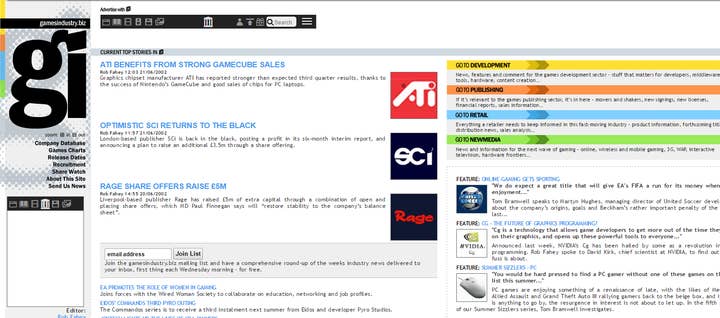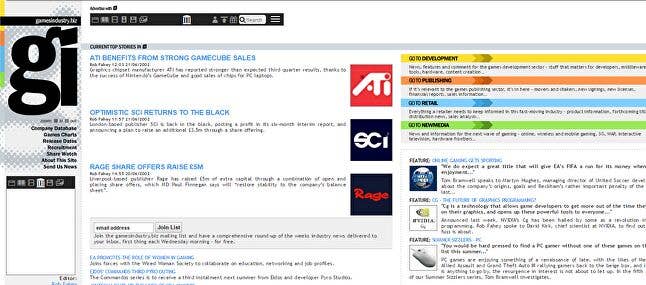Launching GamesIndustry.biz: 20 years ago
We're celebrating a milestone today as founding editor Rob Fahey reflects on what inspired the site's creation and what keeps it going
The following article was originally published on Friday, June 9, 2017 -- a day ahead of our 15th anniversary. Since the story still stands, we'd like to share it with you again as today marks 20 years of GamesIndustry.biz.
You can join us for our 20th birthday party at Develop:Brighton on Wednesday, July 13. Details can be found here.
The site you're reading today was born, 15 years ago, from sheer frustration.
I'd just spent an exhausting, albeit fascinating, 16 months working on CTW (Computer Trade Weekly), a venerable weekly trade newspaper for the games business edited, at the time, by Kristan Reed, who would later become editor of GI.biz' sister site, Eurogamer. CTW was bought out by a rival publisher in early 2002, and the publication's small but very hard-working staff were told that we'd be offered jobs at the new owner. To this day, I don't know where this bare-faced lie originated; we were all made redundant.
That, in itself, was frustrating, but really, it didn't compare to the week-in, week-out frustration of working on CTW; of sending a paper to print on a Wednesday, knowing that it would land on subscribers' desks across the industry on Friday morning... and dreading the inevitability of seeing the front-page scoop appear on some other website by lunchtime on Thursday. CTW was a print publication in an age when the Internet was already firmly established as the way people got their news, and with the best will in the world, expecting something that you knew on a Wednesday to remain secret, fresh and surprising until Friday was less realistic with each passing month.
"If a publication was to build its reputation around news, and analysis of news, print no longer made sense"
If a publication was to build its reputation around news, and analysis of news, print no longer made sense; the time taken to lay out, proof, print and distribute a magazine was short-circuited by the immediacy of the web. It's hardly an original problem, of course; every news-driven publication on the planet was wrestling with these issues in the early 2000s. In the games media, though, feature- and review-driven magazines still ruled, at least for a little while longer, and the problems faced by a weekly trade paper were a different beast.
That, or some rather more frustrated and angry version of that, is the basis of the conversation I had with Gamer Network's founders back in 2002 as CTW's operations wound down. There was value to a good trade paper, and a market for news and information about the business of games; it was the "paper" part, I thought, that was the problem. Gamer Network (then Eurogamer Network), a business that had lived on the web since its inception, understood that; while I don't recall exactly how we got from that discussion to the decision to create GamesIndustry.biz, it was a fairly straight and logical line.

There were a handful of decisions that we made, way back in the early months and years of the site, which I believe have helped to shape it into the publication it is now - and perhaps even to the very fact that it's still here, 15 years later, and that I'm getting to write this self-indulgent reminiscence at all. Some of them were points of principle; we wanted to focus first and foremost on giving readers solid analysis and context for the business stories we reported, which meant engaging in proper depth with financial information, with investors and bankers, and with other aspects of the business which consumer sites tended to skip over (with some justification) as "boring", unless of course it felt like a useful bit of kindling for a console war narrative.
"I often argued, not always to a warm reception, that if GamesIndustry.biz' traffic stats ever really boomed, it meant we'd gone wrong"
Other decisions we made were simply an acceptance of reality, but turned out to be the right moves all the same. During my tenure as editor - the first four and a half years of the site's existence, roughly - we rarely had more than two or three editorial staff, which meant that trying to beat far better resourced online publications to be first with breaking news was often going to be a fool's errand for us. Instead, we decided, we'd get our own breaking news where we could - but by and large we'd be very happy to be people's "second site", to develop a reputation for insightful, well-checked and contextualised reporting, somewhere people in the industry would come to rely on as a source for more in-depth information about a breaking story they'd seen first elsewhere. Faced with the impossibility, given our resources, of being first, we chose to instead establish our reputation on being right - at least to the best of our ability.
We didn't always live up to that, of course, but by and large I like to think that GamesIndustry.biz' continued existence and reputation speaks to an appreciation of what we were trying to accomplish, even if it was sometimes accomplished imperfectly. Our other objective, which ran hand in hand with aiming for accuracy and context over speed, was to cultivate a specific audience - to speak to people who work in the industry, who invest in the industry and who make decisions in the industry, people with a professional need to understand what was happening in the games business. I often argued, not always to a warm reception, that if GamesIndustry.biz' traffic stats ever really boomed, it meant we'd gone wrong - appealing to a wider audience than we should, and probably losing our value to the people we were meant to reach in the process.
On some level, at least, that approach seemed to win us a degree of respect; despite our unquestionably niche status, doors rapidly opened to us, and sooner after our launch than I'd dared to hope we were being invited to interview CEOs and studio bosses who often greeted our introduction with, "Oh, yeah, I read your newsletters" - which are about the most genuinely uplifting words people building a web media start-up from scratch can hear.
"The games industry today looks very different in many ways to the industry back in 2002, though there are a great many parallels as well"
It's been a decade since I was directly involved in the day-to-day running of the site, and it's been great to watch the ways in which subsequent editors have evolved and improved the publication, often taking it in directions I'm fairly certain I couldn't have imagined or accomplished. It's also been great to watch GamesIndustry.biz' "alumni", the very talented people who have worked on or had input into the site since its inception, only some of whom I had the privilege of working with directly, go on to great things elsewhere in the games media and across the industry.
The games industry today looks very different in many ways to the industry back in 2002, though there are a great many parallels as well; in fifteen years the substance of debates over the role and impact of digital distribution, the position of Nintendo and the other platform holders, the potential of indie development and the relevance of mobile gaming have changed enormously, but the debates themselves remain very much active. (One of our first feature articles as a profile of Nintendo's then-new CEO, Satoru Iwata, which wondered how he would restore the company's position in the industry; Iwata is sadly no longer with us, but many of the conversations around the launch of Switch would no doubt have felt familiar to him.)
These and many other topics are long, ongoing and evolving discussions that are important to the industry and all who work in it; I'm very happy and proud that GamesIndustry.biz has had a place in that discourse, however small, and I hope that the site can help to illuminate, inform and provoke thought for many more years to come.
15 Years Ago in Games
- BioWare's Neverwinter Nights, Eternal Darkness: Sanity's Requiem, and the Xbox version of The Elder Scrolls: Morrowind were the big new releases of June 2002.
- Hiroshi Yamauchi had just stepped down as president of Nintendo after 52 years with the company. His successor was 42-year-old Satoru Iwata.
- The extreme sports trend started by Tony Hawk's Pro Skater had begun to wane, as even well-reviewed titles like Aggressive Inline and Kelly Slater's Pro Surfer were failing to set the charts on fire, while true duds like BMX XXX (which featured nudity and an M-rating) helped give the genre a bad name.
- Midway applied the NFL Blitz formula to baseball, hoping MLB Slugfest 20-03 would stand out from a then-crowded field of baseball franchises from Sony, Sega, EA, 3DO, Atari, and Acclaim.
- Coming out of E3 2002, Nintendo was readying a GameCube lineup featuring Super Mario Sunshine, The Legend of Zelda: Windwaker, and Metroid Prime.
- Sony was building its PlayStation 2 holiday lineup around Grand Theft Auto: Vice City, Ratchet and Clank, and Sly Cooper and the Thievious Raccoonus.
- Xbox fans came away from E3 looking forward to an exclusive lineup featuring Ninja Gaiden, Panzer Dragoon Orta, and Capcom's notorious $200 mech game with a convoluted controller, Steel Battalion.
- On the PC side, E3 gave gamers new looks at Doom 3, Battlefield 1942, and World of Warcraft.

